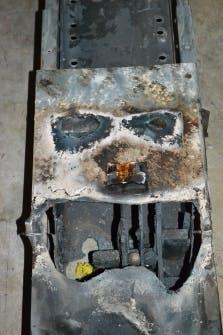12 Reasons Why Electricians Should Always be Looking for Trouble
Do you have an adequate electrical preventive maintenance (EPM) program in place at your facility? If so, then you will be very familiar with NFPA 70B, Recommended Practice for Electrical Equipment Maintenance. Many of the chapters in NFPA 70B relate to different types of electrical equipment and call for a defined periodic “visual inspection” as part of the recommended maintenance.
If your EPM program does not include the recommended periodic visual inspections, then you need to view the slides in this photo gallery, which includes a sampling from the Hartford Steam Boiler Inspection and Insurance Company’s Thermographic Services group. Many of the photos show correctable conditions found by simple visual inspections. You will be surprised to see what can be going on inside your critical electrical equipment if you’re not paying close attention to it.
In an Internet of Things (IoT) world, sensors can be used creatively to monitor just about every negative condition that can happen to your equipment. As you flip through the slides, think about sensors that could detect and annunciate some of these deleterious conditions. If you can’t envision a sensor for some applications, then you will quickly realize the importance of the periodic visual inspection process defined in NFPA 70B.
If you’re not constantly looking for trouble, these photos represent a few ways trouble will find you first — and cost you a lot of money and business disruption in the process!
Editor’s Note: Be sure to read and understand NFPA 70B, Chapter 7, Personnel Safety, before attempting any electrical work. Preventive maintenance should be performed only when equipment is in an electrically safe work condition. Chapter 7 refers to NFPA 70E, Standard for Electrical Safety in the Workplace for detailed electrical safety recommendations that must be followed. All electrical work practices must comply with the applicable OSHA regulations related to safe electrical work practices.
RELATED GALLERIES
About the Author
John Weber
Principal Electrical Engineer
John Weber is principal electrical engineer for The Hartford Steam Boiler (HSB) Inspection and Insurance Company in Hartford, Conn.

